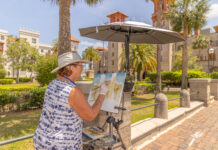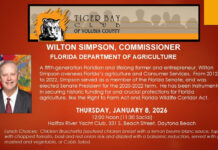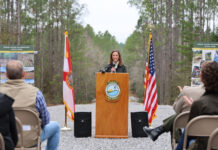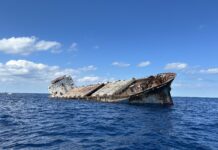Talk about your experience as Flagler County’s emergency management director. How did you get into this field?
I have always been in public safety, since joining a volunteer Emergency Medical Services (EMS) agency in NJ while still in high school. After graduating high school my volunteering turned into an 11 year career in various aspects of EMS. During that career I had to help one of the towns that I worked for update their Emergency Operations Plan, so that was my actual first exposure to Emergency Management. Then when 9/11 happened, I was working for the NJ Department of Health’s EMS Office and was assigned to the NJ State Emergency Operations Center, so that was my first true disaster, other than some blizzards; and it really peaked my interested in the broader field of emergency management. Then in 2003, I was lucky enough to get hired by Miami-Dade County’s Office of Emergency Management, which allowed me to relocate to Florida and begin my full time emergency management career working my way up the ladder within Miami-Dade County, leaving as their Deputy Director of Emergency Management to become the State’s Deputy Director of Emergency Management for a couple of years, before returning to local government as Flagler County’s Emergency Management Director. I have been in this wonderful community since 2018, and have had the pleasure of working with so many amazing public servants, private businesses, and community members; who are all dedicated to ensure that our community is reach for whatever may come our way. It is the amazing community spirit and pride that attracted me to Flagler County in the first place.
What has been the biggest challenge you’ve helped the county navigate since taking the helm?
Without a doubt COVID-19. While emergency managers prepare for all types of disasters, no two disaster are the same; and much of how we prepared for a pandemic was theoretical; though we did have some similar smaller events like the swine flu (H1N1) outbreak, 10 years ago. COVID-19 spread so quickly and was so devastating to seniors and others with weakened immune systems; it put emergency management, and the health experts that we rely upon, at a disadvantage when it came to the best way to protect our communities. The speed at which it spread across the entire globe cause critical supply and personnel challenges, never seen before. Even though we are living in the technology and information age, there was not a lot of scientific information readily available early on. Decisions were made, to protect lives, to implement business and recreation restrictions; that as more scientific data become available, and critical health care supplies became available, we were able to lift. However, the latest technology has also been a huge asset in the fight against COVID-19, as tests and vaccines became available in record time.
Flagler County was lucky last year dodging the hurricane season, and this may have created a lull in preparedness. What should families be doing at this point a month out from the start of the season?
Now is the time to visit www.FlaglerCounty.org/emergency and review our Disaster Preparedness Guide, to help you:
Get a kit: Having a year round disaster supply kit is the first step that all residents and businesses should take. Many Floridians have hurricane kits / supplies; but disasters can strike year round and we ask that everyone have a disaster kit. However, we do like to see people use the approaching start of hurricane season as the time to check, and replace items in their disaster kits. At the end of May and into early June the State Legislature and Governor typically approve a Disaster Supply Sales Tax Holiday, so that is 6-7 cents saved on every dollar spend for disaster supplies, even many portable generators are included in this Tax Holiday.
Make a plan: Now is the time to have a serious discussion with your household as to what you will do if a hurricane is approaching our community. Discussing things like: Who will do what to prepare your home (shutters, check supplies, etc); where you will go if you neighborhood is told to evacuate – have multiple options – public shelters should be a last resort; and if you home is damaged or without power for an extended period of time, how will you get it repaired / manage.
Be informed: Now is the time to determine if you live in a hurricane evacuation zone (you can look up your zone on our website); know whether or not your home has issues that may be impacted by a hurricane, and understanding your insurance coverages and claim processes. Also, being informed means making sure that you can be notified of things like disasters and evacuations. You can do this by signing up for our no-cost ALERTFlagler notifications by selecting ALERTFlagler Emergency Notifications on our website at www.FlaglerCounty.org/emergency or by calling us at 386-313-4200 to help you with signing-up.
Get Involved: For those that are interested in helping our community in a disaster, we encourage you to volunteer with our many great community groups, and sign-up for a free Community Emergency Response Team class. Details can be found under the volunteering and training section of our website at www.FlaglerCounty.org/emergency.
Has the county created any specialized plans to address COVID and potential needs for shelters during hurricane season?
Yes, last year when COVID-19 first began to impact our community, we modified our emergency sheltering procedures to include mask wearing, social distancing, and space for COVID-19+ evacuees. At this time we have many of those same procedures in place, but they will evolve through-out hurricane season as the COVID-19 situation improves in our community. We will continue to work with our public health partners to make sure that we can protect anyone that needs to seek public shelter.
Besides hurricanes and COVID, is there anything else residents should be preparing for during the summer months that may be off their radar right now?
We ask that our residents be prepared for anything and everything year round. Severe Weather is not just limited to hurricanes, we are at risk for severe thunderstorms, tornados, flooding, hail, and even tsunamis; which can threaten lives and damage property with little notice. Also, even though we all live in this amazing suburban/rural utopia of Flagler County; we are not immune to manmade threats such as hazardous materials accidents, or unfortunately even terrorism or mass shootings.














































